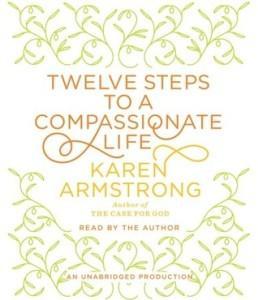 A process for developing personal compassion to engage in compassionate community for a more compassionate world
A process for developing personal compassion to engage in compassionate community for a more compassionate worldWelcome to Compassionate Sunday. We’re working through Twelve Steps to a Compassionate Life by Karen Armstrong, one step per month.
The month of March is devoted to The Second Step: Look at Your Own World. If you’d like to share a post about what you learned about compassion (The First Step) or what you’re seeing in your world, use the link list below or join the discussion in the comments or on Facebook.
Late breaking news…. I wrote the post below before Donald Trump came to town and said that protesters are “not good people” and “so bad for our country” (quotes from the write-up of the event at St. Louis Public Radio). I saw friends and acquaintances among the crowd so I can tell you from personal experience that they are very good people who have worked countless hours since August 9, 2014. They are not only in the streets but also show up for meetings and volunteer activities (places where the media never makes an appearance), working to heal deep wounds in St. Louis. Let me know if you need me to make the case for compassion for protesters because it would be my pleasure to write that.
Back to regularly scheduled programming…. Last week, I confessed that I leap too quickly to a judgmental stance when I look at my world, which is SO not the point of The Second Step in Twelve Steps to a Compassionate Life. I used, as an example, Trump supporters — a group that I’m more inclined to look at with contempt rather than compassion. Several commenters shared my difficulty in this area.
Since there are forces for good in the universe, a number of things came together for me this week to help me view Trump supporters with less “anger, frustration, or impatience” as Karen Armstrong suggests.
A Compassionate Lens on Trump supporters
Some sad demographic data is the first piece that I needed to develop a more compassionate lens. Mortality rates are shrinking in every demographic but one — low-educated middle-aged white people. People are dying. They are dying from diseases related to despair (alcoholism and other drug abuse, suicide) and from diseases that usually kill older people but strike younger at this group (heart attacks, diabetes, respiratory illness). For more details, see this article in The Atlantic: Why Are So Many Middle-Aged White Americans Dying?
 American Masculinity at the End of an Era
American Masculinity at the End of an EraA book on my TBR (that I’m saving for a later step in Twelve Steps to a Compassionate Life) may help me understand what’s going on here. The Goodreads description of Angry White Men by Michael Kimmel includes this:
Angry White Men discusses, among others, the sons of small town America, scarred by underemployment and wage stagnation. When America’s white men feel they’ve lived their lives the ‘right’ way, worked hard and stayed out of trouble, and still do not get economic rewards, then they have to blame somebody else.
These are the guys I grew up with. These are my cousins. They were raised to expect one thing and the world shifted beneath their feet. Our society gave them lots of tools to handle the world as it was and few to handle the world as it is. My belief that the world is better now does nothing to relieve the warped disconnect from reality that was inflicted on them, the kind of distortion that would lead to stress and despair.
Authoritarianism
One of the tools that our society gave to working class white men was the ability to follow authority (parents, bosses, sergeants, etc) and, in their patient turn, to take a position of authority over children and employees.
Recent data shows that authoritarianism correlates more with Trump supporters than any other trait, as described in The Rise of American Authoritarianism. Vox isn’t necessarily a site I’d trust for a compassionate view of conservative values. They did pretty well in the description part of this article, though, following the lead of modern researchers.
Twentieth-century research in this area stemmed, as you might expect, from the question “Why did ordinary Germans support the Nazis?” But it didn’t yield much, in part, because of the judgmental stance of the researchers — rejected by modern researchers:
More than that, this early research seemed to assume that a certain subset of people were inherently evil or dangerous — an idea that Hetherington and Weiler say is simplistic and wrong, and that they resist in their work. (They acknowledge the label “authoritarians” doesn’t do much to dispel this, but their efforts to replace it with a less pejorative-sounding term were unsuccessful.)
One of the disturbing bits of data to me was the number of people who see themselves at higher risk of being harmed by ISIS than by car accident. That’s a failure of media and of education more than it’s a failure of people who believe it. That brings me to….
Trump Supporters are not Stupid
That’s the headline for an article by a British observer on Medium. Emma Lindsay argues that people want dignity and America sucks at providing that. We’re much better at shaming each other than we are at appreciating each other (and the internet has only placed that on a grander stage).
A Facebook post by a friend of a friend, Keith Rose, clarified this point for me this week:
Trump speaks to a huge portion of America which has been pushed aside and locked out of the political process by cultural elitism (which probably includes you).
They are beyond tired of your jokes about Walmart shoppers, of your insults of Country music, of your references to them and their homes as “fly-over country”, of your implications that the small towns which make up the centers of their lives are “in the middle of nowhere”, of your insistence that owning guns is insane (as opposed to a necessary way to preserve important cultural traditions, including hunting), of your blaming farmers for destroying the planet without acknowledging that they have sustained your big-city existence, of your degrading remarks about fast food (often the only restaurant food accessible to them), and of your constant portrayal of religiousness as being akin to barbarianism or mental illness.
And so, when you mock him and you mock them, you are only reinforcing the narrative that nobody will stand up for them, except for their new champion Donald J. Trump. And that will only increase his appeal to this sizable voting bloc.
A Call to Compassionate Intellectualism
 from Wikipedia
from WikipediaAs a music-lover, I have a suggestion. If you appreciate symphonic or operatic music, think about what it took to get you there. Then, spend exactly that amount of time and effort on appreciating country music. I promise you’ll be rewarded. It’s Women’s History month, so you could start with the Wikipedia articles on June Carter Cash, Dolly Parton, and Emmylou Harris.
Keith Rose’s list of ways that mainstream America disparages the type of people who turn out to support Trump showed up one day on my Facebook feed. The next day I saw a rash of links lamenting anti-intellectualism. In the past, I would have shared them. Now, I’m coming at that with a different view.
I’m remembering how critical I am of pieces that state that American Christians are under attack. Christianity in the US is the position of privilege so claiming to be the victim gets things the wrong way around.
Complaining about anti-intellectualism is the same thing. Clearly, those of us who are well-educated hold the position of privilege. If we’re feeling attacked, we’d do well to look at the ways that we’re attacking others rather than act the victim. Who have we put so on the defensive that they are lashing out at us? How can we use our education and intellect to make our points in ways that are more likely to be heard? I’m going to guess that compassion is at the root of the answer.
I think I’m making progress! What do you think? Am I getting closer to looking at Trump supporters through a lens of compassion? Did this post help you do that?
